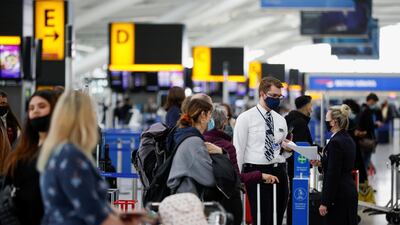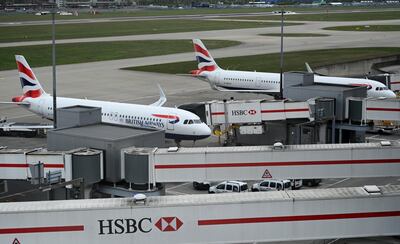Covid checks at airports could leave passengers facing an eight-hour wait in departures and arrivals, the International Air Transport Association (IATA) said.
The IATA said the time needed to get through check-in, security, border control and baggage claim had already doubled to three hours, even with travel at reduced capacity.
If passenger numbers returned to pre-Covid levels, this would rise to eight hours per trip, it said.
IATA director-general Willie Walsh urged governments to agree on standards for digital health certificates to reduce delays.
“Nobody will tolerate waiting hours at check-in or for border formalities,” he said.
“The technical solutions exist. But governments must agree digital certificate standards and align processes to accept them. And they must act fast.”
Britain lifted its ban on foreign holidays on May 17 but quarantine-free travel is only possible to a small list of approved countries.
Meanwhile, France and Germany have placed tougher restrictions on Britain because of fears over the B.1.617.2 variant first identified in India.
The travel industry wants the green list to be expanded to include countries such as Spain, which is opening its doors to British tourists.
"I fear the government is going to drag its feet on Spain," Heathrow Airport chief executive John Holland-Kaye told the Daily Telegraph.
“I think that will be a mistake and the reason for that is that very few people are flying in spite of all the hype we see.”
The EU hopes to bring in a certificate by the end of June that would allow people to prove they have been vaccinated, tested negative for Covid-19 or recently recovered from the disease.
EU members will be obliged to accept vaccines approved by the European Medicines Agency, which has authorised the Pfizer, Moderna, AstraZeneca and Johnson & Johnson shots.
Countries may also choose to accept other vaccines, such as Russia’s Sputnik V shot or China’s Sinopharm.
Britain is still developing its plans for Covid certification, but passengers can view. their vaccine status on the NHS smartphone app.
The IATA called on leaders who are meeting in Britain at next month's G7 summit to agree terms for a universal certificate.
“A good first step would be G7 agreement, with industry input, on a common set of Covid-19 travel requirements,” Mr Walsh said.
“If the G7 took these leadership measures, the freedom to travel could be seamlessly restored for about a third of all journeys. Other countries could build on that leadership for a safe and efficient global restart of connectivity.”
According to the IATA’s figures, passengers typically spent an hour and a half in the airport before the pandemic. This has doubled to three hours, mainly because of longer waits at check-in and border control.
It said the total time would reach five and a half hours if traffic returned to 75 per cent of its pre-crisis levels and eight hours at 100 per cent traffic.
Passenger numbers are currently at about 30 per cent of pre-pandemic levels, Mr Walsh said.



